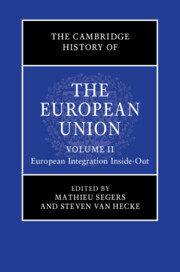Book contents
- The Cambridge History of the European Union
- The Cambridge History of the European Union
- The Cambridge History of the European Union
- Copyright page
- Contents
- Figures
- Tables
- Contributors to Volume II
- Acknowledgements
- Abbreviations
- Reflections on the History and Historiography of European Integration
- Part I Milestones: Treaties and Treaty Changes
- Part II Instruments of Integration
- Money and Society
- 7 In the Name of Social Stability: The European Payments Union
- 8 Competition versus Planning: A Battle That Shaped European Integration
- 9 Commercial Banks, the Eurodollar Market and the Beginnings of Monetary Integration
- 10 From the Werner Report to the Start of EMU
- 11 The Euro Area Crisis: From Pre-history to Aftermath
- Challenges of Expansion: Protection and Security
- Part III Narratives and Outcomes
- Index
- References
10 - From the Werner Report to the Start of EMU
from Money and Society
Published online by Cambridge University Press: 12 October 2023
- The Cambridge History of the European Union
- The Cambridge History of the European Union
- The Cambridge History of the European Union
- Copyright page
- Contents
- Figures
- Tables
- Contributors to Volume II
- Acknowledgements
- Abbreviations
- Reflections on the History and Historiography of European Integration
- Part I Milestones: Treaties and Treaty Changes
- Part II Instruments of Integration
- Money and Society
- 7 In the Name of Social Stability: The European Payments Union
- 8 Competition versus Planning: A Battle That Shaped European Integration
- 9 Commercial Banks, the Eurodollar Market and the Beginnings of Monetary Integration
- 10 From the Werner Report to the Start of EMU
- 11 The Euro Area Crisis: From Pre-history to Aftermath
- Challenges of Expansion: Protection and Security
- Part III Narratives and Outcomes
- Index
- References
Summary
In November 1968, the finance ministers of the Group of Ten, comprised of the leading industrial nations, convened in Bonn for an emergency meeting. It focused on recent monetary turbulence in the markets, particularly the rampant speculation against the French franc and the British pound, but also on the weakness of the American dollar, a core issue of international monetary diplomacy throughout the 1960s. The finance ministers of France, the United Kingdom (UK) and the United States, representing the major Western allies of the Federal Republic of Germany (FRG), exerted strong pressure on the Germans to revalue their currency so as to stop the speculative movements against the weaker currencies. (Throughout this chapter, unless specified otherwise, ‘Germany’ and ‘Germans’ refer to the FRG.) Their efforts were to no avail. The proceedings, humorously described in many ex-post accounts, soon bordered on the farcical and ended with complete disagreement.
- Type
- Chapter
- Information
- The Cambridge History of the European Union , pp. 284 - 307Publisher: Cambridge University PressPrint publication year: 2023

